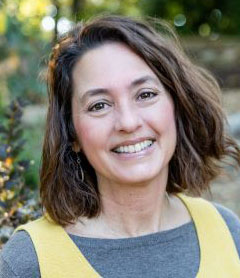It’s my favorite time of year — Halloween! — so I thought I’d discuss wicked problems. Wicked problems are complex, social problems that are constantly changing — which are exactly the kind of problems we face at Virginia Western. Design thinking is a methodology that can help us address these wicked problems (and write grants to tame them). I love this approach because it puts the human — the student — in the center of design. This means more than just deploying student surveys. We should be interviewing and observing students, yes, but we should also be going through the same experiences as students and potential students (websites, forms, processes, etc.). Empathy is key, and it’s only the first step. I’ve been reading about design thinking and creative problem solving for over a decade, so I could shower you with all kinds of information. But I will limit this post to just a few treats, which you can use in the classroom and in your own life: 1. For an overview of how design thinking applies to higher ed: Start with this summary, Using Design Thinking in Higher Education (I especially like the Montgomery Community College example). This more recent… Continue Reading We face wicked problems, personally and professionally. Design thinking can help.Read More
One of my favorite genres of articles involve creativity in the schools, which are usually about K-12 initiatives that stretch way beyond our standardized-testing mania. I can’t resist sharing some of my favorite ideas I’ve learned about in the last few months: Grand Rapids Public Museum School, where a struggling school district opened a school *inside* a struggling museum. The museum’s collections are folded into the curriculum, and students learn through hands-on, community-based activities, including a local river-revitalization project. ( More )An outdoors-oriented Forest Kindergarten program at a public elementary school in Georgia, which builds its curriculum around year-long research projects at each grade level. ( More )Tiny Trees, an outdoor preschool program in Seattle, which partners with the city’s parks and recreation program to provide hands-on, nature-based experiences. ( More ) Collecting these kind of innovative ideas is critical to my role in grants, as I’ve explained before. Just last week, I stumbled upon this article: How Schools Can Stop Killing Creativity (which is really just an excerpt from a new book called “Pushing the Limits.”) I recommend reading the entire story, but there was one nugget, way down in the article, that relates directly to an issue we are struggling… Continue Reading Let’s ask students: How might Virginia Western boost enrollment and retention?Read More
She laughs when I call her a “grant dreamweaver,” but that’s how I see Amanda Decker and her superhero role at Virginia Western. Amanda is currently the Workforce Student Services Team Lead and Career Navigator. She’s my go-to contact whenever I have grant-related questions involving the Workforce division … and those questions are multiplying, especially as more funders are emphasizing short-term, non-credit credentials. In 2017, we’re tracking over $1.3 million in 13+ grant projects through Workforce, ranging from as little as $1,000 (for outreach to local faith leaders) to $439,062 (a program to help TANF recipients become self-sufficient). Amanda is critical to the success of these grants, especially when she “braids” various funding streams for individual students. She explains more about dreamweaving, her love of superheroes, and her own backstory in this Q&A. Amanda Decker Current job titleWorkforce Student Services Team Lead and Career Navigator Years at VWCC5 Please summarize your educational/career backgroundI have a B.B.A. with a concentration in Marketing from Roanoke College and a Master of Arts in Human Services: Life Coaching from Liberty University. Certifications I hold: Global Career Development Facilitator and Instructor, Virginia Career Coach, and Workforce Development Professional. Before coming to VWCC, I was a… Continue Reading Amanda Decker, Workforce career navigator, is really a grant-weaving superheroRead More
About Shelley
 Shelley Lyons is glad to be back on campus as she is a Virginia Western alum, and has served as the Administrative Officer for Grants Administration at Virginia Western since early 2022. Prior to VWCC, her career focus was within the Human Services and Arts fields. She wrote her first grant in 1996 on a whim and has continued to plan and learn since that time. She most enjoys seeing a well-planned project come to fruition, where funder, project manager and beneficiaries can all feel success and see impact.
Shelley Lyons is glad to be back on campus as she is a Virginia Western alum, and has served as the Administrative Officer for Grants Administration at Virginia Western since early 2022. Prior to VWCC, her career focus was within the Human Services and Arts fields. She wrote her first grant in 1996 on a whim and has continued to plan and learn since that time. She most enjoys seeing a well-planned project come to fruition, where funder, project manager and beneficiaries can all feel success and see impact.
Recent Posts
- Have you heard? October 28, 2024
- The Game of Life – Innovation Edition! August 29, 2024
- Why Try An LOI? May 10, 2024
- Grant Nerds Unite! March 12, 2024
- The Power of Collaboration November 17, 2023

